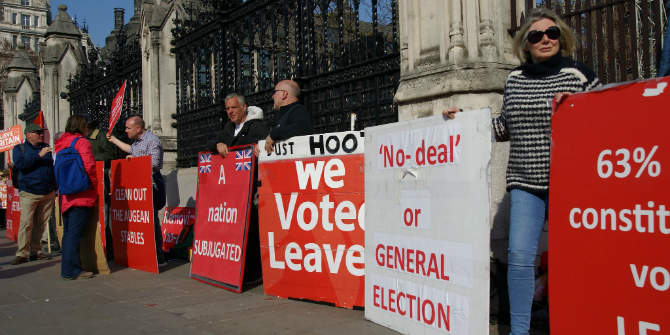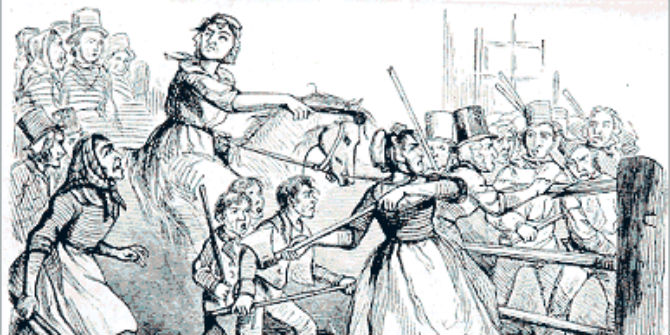
Did asymmetrical devolution in the United Kingdom engage the English nation in ways that might help to explain the contribution of English nationalism to the Brexit vote? There seems to be some agreement that English nationalism indeed contributed to Brexit, writes Hudson Meadwell (McGill University). However, he argues, those who take this line are less agreed on how and when the contemporary politicization of English nationhood occurred.
For example, in their accounts, both Michael Kenny and Ben Wellings deny or downplay the causal importance of devolution to emphasize political dynamics in British history before the late 1990s. Welling points to the growing salience of the issue of European political integration and Euroscepticism prior to devolution in explaining English nationalism. Kenny takes a longer view and emphasizes a growing crisis of confidence in, and scepticism about, the institutions of the British state, which came to have consequences for the “self-understandings of the English”.
Yet, neither dismisses the importance of devolution altogether. Kenny treats devolution as a response to the growing culture of malaise and intellectual scepticism he identifies in Britain from the 1970s onward. To which we can add, however, that the national demands and challenges to the territorial status quo in Scotland and Wales which led to devolution themselves contributed importantly to this crisis of confidence in British political institutions. It is not obvious that the causal arrows run in one direction. Devolution as a process, as Kenny partially acknowledges, is itself implicated in the production of the circumstances from which devolution as an event was one result. This may seem circular, but it is not a vicious circularity. It does raise difficulties, though, for an account that wants to discount devolution as an event by focusing on an earlier time period in which devolution has its genesis as a political idea and helped to shape the ‘climate of the times’ which yielded devolution.
For his part, Wellings does note that the acceptance of devolution by the Conservative government after it was introduced by a Labour government was a watershed in British and English politics. Like Wellings, we might see Euroscepticism behind English nationalism, independent of any consequences of devolution for the latter. Still, one wonders if the causal arrows here also might run in two directions: Could English nationalism not contribute to Euroscepticism as well as vice-versa? Moreover, a conceptual problem potentially arises if our ultimate interest is in explaining Brexit, and if we consider this ‘reverse causality’ in which, by hypothesis, English nationalism contributes to Euroscepticism. It arises because Euroscepticism seems to be too ‘close’ conceptually to a Leave vote in Brexit. While aware of the literature that uses Euroscepticism as a causal variable in explanations of Brexit, I am inclined to think that Euroscepticism is a constitutive or conceptual feature of a Leave vote rather than an empirical cause. Explaining the Leave vote in the referendum by invoking Euroscepticism or Eurosceptic-induced English nationalism is a little like arguing that opium puts people to sleep because it has dormitive powers, to draw an analogy to an older problem in the philosophy of science.
In any case, nothing in either of these arguments rules out other contributing causes of English nationalism, including devolution. Thus, I think we can discuss the independent importance of devolution to the political mobilization of English nationhood, once we think of devolution as a contingent political act or event which did induce a reaction in England and which does not reduce to the complex period of British history which predates it. When we do, there is likely no circularity to worry about. No one argues that English nationalism contributed to devolution (certainly not directly and I think a fuller examination of any indirect contributions would not depend on English nationalism per se). There is also no conceptual problem as above. Neither English nationalism nor devolution are conceptually related to Brexit. Nevertheless, the most important reason to look at devolution and its relationship to English nationalism is theoretical rather than methodological. Devolution may matter and why and how it matters is important to a fuller understanding of current predicaments.
I take this observation made by Helen Thompson to heart: “In pushing asymmetrical devolution for Scotland and Wales, the Blair government should have remembered that Home Rule for Ireland proved so politically difficult partly because nobody could figure out how to achieve it without producing discontent about England’s representation in parliament.” The observation injects historical perspective into the discussion of contemporary political dilemmas, it raises the question of historical learning, points to the intractability of constitutional change, and poses the issue of English reaction to devolution.
So, here is the question: Did asymmetrical devolution in the United Kingdom engage the English nation in ways that might help to explain the contribution of English nationalism to the Brexit vote? ‘Asymmetrical devolution’ [hereafter AD] refers to the establishment of elected assemblies in Scotland and Wales in 1999 without at the same time creating a regional assembly, or better, regional assemblies in England. If this opening question is answered affirmatively, so that the answer stands as a claim or hypothesis, there are two implications to which I would draw attention.

The first is an implied causal counterfactual: The causal history of the United Kingdom’s relationship with the EU could have been different. Let’s state this implication in strong terms: No English nationalism, no Brexit. Post-devolution English nationalism is a difference-maker. Without specifying where the difference would have emerged, there are in principle several places along the causal path where deviation from the actual might have occurred in ways that satisfy the counterfactual, such as no David Cameron negotiation with the EU, or negotiations but no referendum, or a referendum but a different result, for example. These details matter, but not to my point that the argument about AD implies just such a counterfactual, however that counterfactual is filled in. I do acknowledge that causal counterfactuals are complex things to parse, but I will not go further here.
The second implication arises in the realm of political normativity: It would have been better, not just practically, but in some normative sense, perhaps measured in fairness, if the devolution extended to the Scots and Welsh was also extended to the English. If it had been, English nationhood would not have been mobilized in the ways that it was, and Brexit might not have occurred. One could note as well, at least for the sake of completeness, that there are two ways in which the contrast to asymmetrical devolution might be instantiated — one via devolution without asymmetry, the other is simply no devolution at all – thus raising the question of whether any practical or normative reservation about asymmetrical devolution implies that no devolution at all would have been better than asymmetrical devolution. This, in turn, might appear to imply, as it does to me, that there was no good reason to make devolution asymmetrical.
Further, then, this second implication might identify a social psychological motivation for nationalist mobilization in the wake of devolution, namely resentment in the English nation at the injustice – the unfairness — of asymmetrical devolution when devolution did occur. Perhaps ‘resentment’ does not fully capture the psychological dynamic. One might think as well of a form of political envy: ‘if devolution is good enough for you, why is it not good enough for me?’ One could also consider simple political opportunism: Devolution for others provides an opportunity to claim devolution for oneself, where the ‘self’ is a national self, and thus political opportunism inadvertently mobilizes the nation. All of these might be correlated, overlapping phenomena. For the purposes of this discussion, though, I won’t try and parse this psychological mechanism further.
However, any social-psychological mechanism we identify in connecting devolution and English nationalism should, in my view, have built into it a very explicit recognition of English political dominance. What were the object relations of resentment in this case, if indeed we stick with resentment as the mechanism in play? Was it resentment because England shared an equal political status and rank in the United Kingdom with Wales and Scotland, yet was not allowed assemblies of its own as were Scotland and Wales? One could argue that this result would be objectively unfair and unjust. But to agree to this, we would have to ignore the facts of English political dominance.
English nationhood became mobilized so as to reassert England’s dominant position, so that minority nations in the United Kingdom would not hold political statuses or have political standing that the majority nation did not. Asymmetrical devolution was neither unfair or unjust in any objective sense, and it is more likely the social psychology of habituated dominance, when the latter is challenged or modified, rather than the psychology of resentment proper that fuelled the emergent mobilization of English nationhood. Resentment is labile, it can be secreted in a range of situations. I don’t want to deny the potential importance of resentment. Nevertheless, it may not be specific enough to capture the mechanism that, by hypothesis, motivated and motivates discontent in England about devolution. Dominance, on the other hand, has been baked into the political DNA of England for a long time. One, therefore, needs to consider the psychological precipitates/correlates of taken-for-granted dominance, once that dominance can no longer be taken for granted.
My suggestion is to take a step back and consider other, apparently obvious, kinds of asymmetries that are a part of the organization of nations in the United Kingdom. At least two such asymmetries come to mind. The discussion here will follow the literature around AD which is largely based in contemporary politics. Still, the history of AD cannot be completely avoided. The UK is demonstrably a composite of unequal political parts in which there is a majority nation and minority nations inside Britain and an unresolved relationship with a colonial remnant in the larger ‘union’. This is the first asymmetry to which I would draw attention, essentially the asymmetrical power relations that structure the United Kingdom.
The second asymmetry is related. Leaving aside Ireland and the adjustments to the relationship with the north of Ireland that followed the peace process and which occurred around the run-up to and eventual creation of Welsh and Scottish elected assemblies (Irish adjustments were eventually coordinated with assembly-creation), asymmetrical devolution is a consequence of demands from two minority nations in the United Kingdom – Scotland and Wales – but not from the majority nation – England. From the mid-1960s, at different speeds and with quite different political inflections, the politics of Scottish and Welsh nationhood became organized around autonomy. There are several ways to cash out autonomy in political terms. Without discounting the growing importance in these years of support for outright separation in one of these cases, ‘devolution’ became one of those ways. However, devolution, perhaps more sharply, a demand for an elected assembly of ‘one’s own’, did not became a rallying cry in England. The irresistible inference is that English dominance in the House of Commons meant that regional English assemblies did not have much political salience. Dominance, however, does not make Parliament the agent of England, if you are wondering why English dominance cannot always be translated into English outcomes. Parliament, and its governments, have an organizational logic that limits England’s capacity to serve as a principal (or in formal terms as a dictator), a logic which is rooted in part in partisan party competition. (It is interesting that the best work on these kinds of organizational relationships between political actors and political institutions, including elected legislatures, is being done on hybrid political regimes rather than democratic regimes proper).
While this might be too starkly stated, and require more nuance than I can give here, one could say that as long as dominance is taken for granted, the English nation is quiescent, when dominance is directly challenged and no longer self-legitimating, English nationalism is engaged. Yes, there was the occasional reference to the ‘West Lothian question’, as discussion about devolution for Scotland and Wales deepened, but criticisms of the territorial distribution of power, and demands that it be changed, did not take on anything like the importance or substantive direction that they did in the minority nations of Wales and Scotland. England appeared relatively satisfied and did not challenge the territorial status quo, which is not surprising given its dominant status as the majority nation. Satisfied, that is, until Scots and Welsh elected assemblies were created. This is where the argument about asymmetrical devolution that I introduced at the outset enters the narrative.
The asymmetry of devolution must be understood in conjunction with these other asymmetries, one structural (the unequal composition of the national and post-colonial parts of the UK) and the other behavioural (the different national responses of Scotland and Wales on the one hand and the English on the other to the distribution of territorial power). Asymmetrical devolution was a challenge to the territorial structure of the United Kingdom, and hence to the political dominance, of England. Once some degree of political autonomy was conceded by the state in the form of devolved elected assemblies (whether these legislatures are constitutionally protected from shutdown by Westminster Parliament remains ambiguous), English nationhood may have become engaged and mobilized, but it would be a stretch to attribute that mobilization to perceptions of injustice rooted in objective unfairness, and fuelled by the social psychology of resentment or envy. Such a conclusion does not take into account the importance of political dominance in the structure of the United Kingdom and misidentifies the psychological correlates of dominance.
Moreover, the politics of asymmetrical devolution, and English reaction, cued or anticipated responses to the evolving power structures of the European Union and the threats that its structures might mean for English dominance. Devolution and integration engage some of the same responses in England, rooted as these responses are in the loss or projected loss of standing in domestic and international hierarchies. (Obviously, in drawing out this relationship between domestic devolution and international/regional integration, I am leaving out a lot of the relationship between Britain and its English core and the idea and practice of European integration, notably the historical ‘back and forth’ ambivalence of the British toward Europe and integration).
The long history of English political dominance and asymmetrical power relations among the nations of the United Kingdom may go a long way toward understanding the current state of politics.
This post represents the views of the author and not those of the Brexit blog, nor the LSE. Image: mat Walker (CC BY 2.0).
Hudson Meadwell is Associate Professor of Political Science at McGill University.







Nice to see the fact of English domination of UK politic realities recognised, and the self-pitying argument about ‘unfairness’ re devolution refuted. Not mentioned (possibly for reasons of space) is the rejection of local devolution by English regions when it was offered to them. Perhaps they would have a different reaction now?
English is now a dirty word.The Scots can wave their flags, The Irish can be proud to be Irish now that they are no longer killing each other. England , apart from London is much poorer in coastal places than it was 40 years ago..Our Parliament and everyone else insults the English. What does Parliament expect when as a coastal state England has to import fish. i can understand the global pressure of steel produstion , cars and heavy industry, but the careless loss of our fishing industry is a great tragedy.Fishing is important in France and a great employer. Take away a man’s living , reduce him to poverty , deny him a decent transport system so taken for granted by those ruling us from London and what does Parliament expect. I am amazed that there has been so little violent trouble. But then we are not a violent people..when it comes to politics.